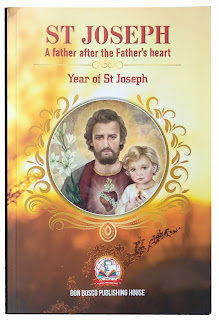Homily on the Feast of Don Bosco
An Appraisal of the homily delivered by His Grace Bishop
Lourdes Daniel, Archbishop of the Diocese of Nashik, on the Feast of St. John
Bosco (January 31st) at the church of St. John Bosco, Nashik.
The readings of the day (Isaiah – Sheep and shepherd, Philippians
– Christian life and Matthew – the greatest must be like a child) are like a
letter to each one of us. Why there are so he did not say explicitly. He
nevertheless, made reference to the paternal concern that the readings alluded
to. Another reason for calling the readings a letter could be the kind of
language and tone used in the readings. As said earlier, they had an
instructional character and exuded concern.
He went on to say that “we seek God not to possess Him but
to be like Him.” I’m not in complete agreement with that statement. God is not
an object to be possessed and I’m not implying that He is one but I think that
the spiritual quest involves a kind of possession of God. Since our
relationship with God is characterized by love and love involves a certain
amount of possessiveness of the beloved, our relationship with God too must
involve this tiny amount of possessiveness that is inherent in a loving
relationship. This possessiveness is not only from our side, God too is
possessive of us. The Bible, especially the Old Testament is full of examples. (Ex
19:5, 20:5; Deut 26:18) I know it doesn’t seem right to equate the nature and
dynamic of our human relationships with the nature and dynamic of our
relationship with God and for that matter, of God’s relationship with us, but
arguing from the human side of the God-man relationship, how else can we
understand or explain this relationship except in ‘human’ terms? Perhaps we are
not qualified to speak about God’s relationship with us. We cannot know for
certain how God thinks and acts, although we attempt to do so. But we surely do
know how we think and act especially in relationships and from this point of
view, I think my position is justifiable.
This being said and done, we must be careful not to make God
a goal to be achieved once and for all. The spiritual life is a journey that
continues till the grave (and perhaps even beyond!). Our spiritual life leads
us to the ultimate goal: the beatific vision – seeing God face-to-face, and
being in His company for eternity. In the bargain, we strive to live as God
wants us to, as He has revealed through the Scriptures, through tradition,
through our conscience and even through those around us. This effort we make
gradually leads us to living god-like lives, i.e., lives that are based on
divine virtues. In this sense, our spiritual quest is an effort to be like God
but that isn’t the goal. The goal remains the Beatific Vision. A god-like life
is the fallout of the striving for achieving the goal and is not the goal
itself.
I don’t refer to possession of God as having Him but as being with
Him and this view does not coincide with the usage of the term by Bishop
Lourdes, who probably used the term to mean ‘having’. In his usage of the term,
his statement is justifiable and I take it that he meant it in that way.
His Grace posed an important question for reflection: Are we
aware that we hear the Lord speak to us in the Eucharist? It is through the Eucharist,
he points out, that God is forming us to fullness of life. How can such
formation take place if we aren’t attentive? Margaret Bosco (John Bosco’s
mother) gave her children a solid foundation in life: Jesus. She was widowed at
a fairly young age and was left with little resources to look after a family of
3 boys and an elderly mother-in-law. Despite her material poverty, Margaret was
spiritually rich and it was from her that John Bosco, later Don Bosco, learnt
his first and perhaps greatest lessons. The foundation she gave her children,
Jesus, was the best thing she could give them, for when we have Jesus we have
everything.
Don Bosco saw the situation in Turin and he responded to it. He didn’t let
it remain a news item or a subject for discussion. He actively participated in
resolving it. The Bishop urged the faithful to follow this example of Don
Bosco. He implored everyone to go out of their way to save a child, citing the
incident between Don Bosco and Bartholomew Garelli. The Bishop made a very insightful
and apt comment on the feast saying that “if we remain indifferent to the young
in difficult situations, Don Bosco’s feast is valueless.” He urged the faithful
to “dare to do something for the young”, to “take the risk” of extending help -
the young person could turn out to be a drug addict, an alcoholic, a criminal
or perhaps even someone great, respectable and successful.
The Bishop commented on the decreasing size of families and
urged the parents to give their children a firm foundation, namely, Jesus
Christ. I think the Bishop has struck the right note. Today we find parents
trying their best to give their children the best that they can and making sure
that they hardly find themselves in need but they often forget to give them
their faith. Children these days have the latest clothes, shoes, apparel,
accessories, gadgets and toys but they seem to lack the basic values of love,
authentic friendship and faith.
He observed that the Christian life doesn’t need money –
just because I’m poor doesn’t mean I can’t love my neighbour; Just because I’m
poor doesn’t mean I can’t serve someone in need. The Christian life isn’t about
having and not-having health, wealth and other materials, it’s about living
the commandment of love of God and love of neighbour. To live the commandment,
one doesn’t need any material goods for the commandment doesn’t ask to give but to love and love isn’t about giving things but rather about giving
oneself.
He concluded with the exhortation to “make God the center of
[y]our lives” so that we can all become saints.
The first part of the homily was more doctrinal while the
second part was more pastoral. I enjoyed listening to the Bishop speaking from
his heart especially when he came to the pastoral part. His tone changed
(slightly) and what he said had greater appeal because he was addressing
everyday issues and incarnating the Word in them, thereby showing us how we can
live better Christian lives even as we encounter these issues. This, according
to me, ought to be the crux of every homily preached from every pulpit. The
doctrine is important but what is greater is the incarnation of the Word in the
everyday situations of people. If priests can help the faithful to see God’s
will in the milieu they find themselves in, the faithful will learn to discern
God’s will for them. They will slowly begin to make the connection between
faith and life. God will not be remote but someone close to them. The role of
the priest is crucial in this regard. Alas! How many of them are aware of their
delicate role and responsibility?



Comments
Post a Comment